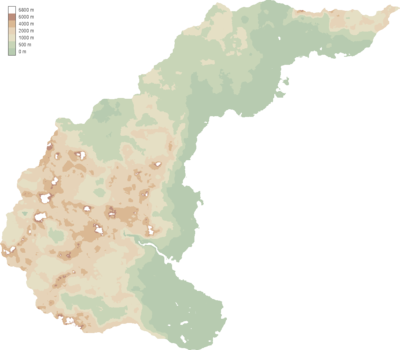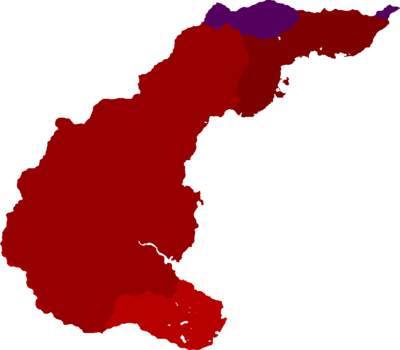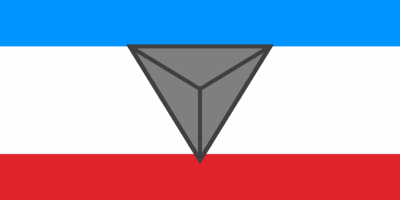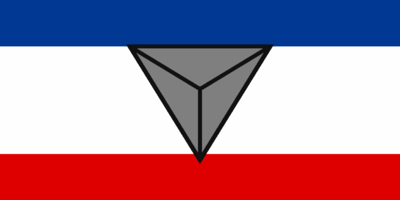KSKM
|
Kalban States of Kerbia and Mentonogra
Калбанске државе Кербија и Ментоногро
|
|||||
|---|---|---|---|---|---|
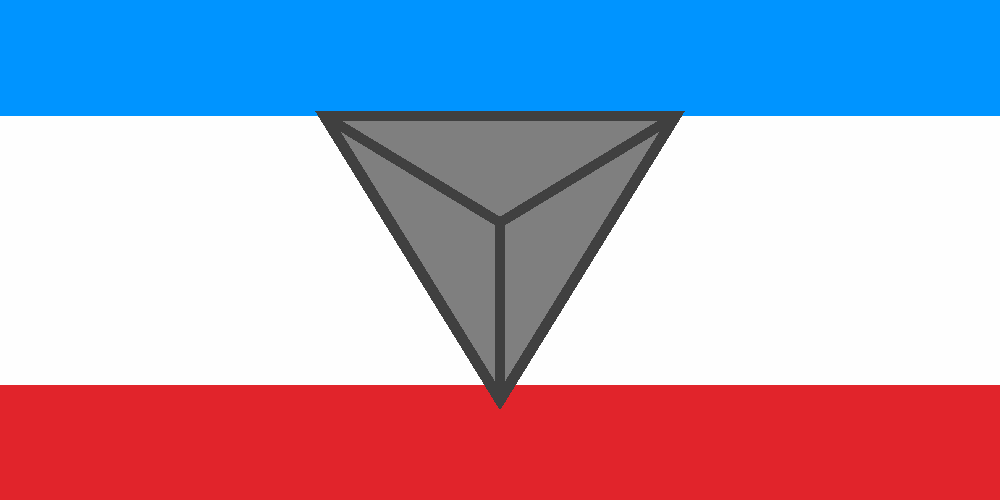 |
|||||
| Motto | "Само јединство штеди ивичњаке" | ||||
| Common Name | KSKM | ||||
| Anthem | "Remove Kerbab" | ||||
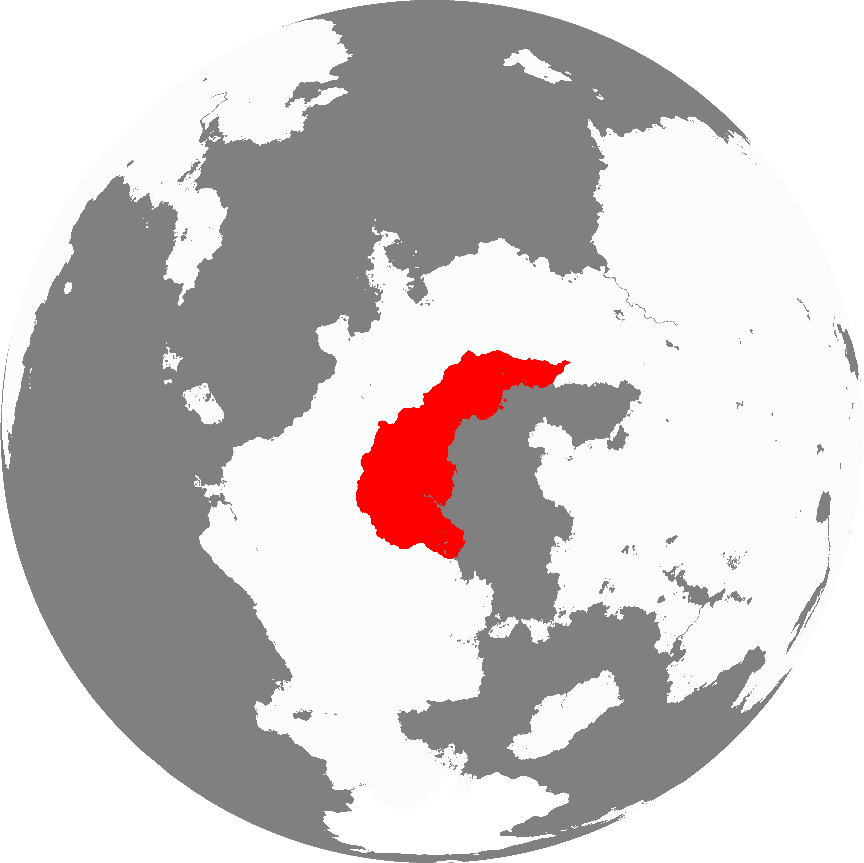 |
|||||
| Demonym | Kalban | ||||
| Official languages | Kalbanian, Tezan | ||||
| Currency | Kalban Mapka | ||||
| Politics | |||||
| Capital | Balgred | ||||
| Government | Federal republic under a dominant-party state | ||||
| Foundation | 2045 | ||||
| Preceded by | Kerbia, Mentonogra | ||||
| Followed by | DFK, SKR | ||||
| Demography | |||||
| Ethnicities | 87.9% Kalban 6.25% Pursman 5.85% Other |
||||
| Population | 12,462,272 | ||||
| Area | 37,231km² km² | ||||
The Kalban States of Kerbia and Mentonogro was a confederation in the south-eastern Minor Baskay Bay area. It was the successor to the greater Kalban States and dissolved in 2071.
Etymology
Kalbans is the name given to the area surrounding the Minor Baskay Bay by Kerbs, Mentonograns, Behian and Troakian. Its origin is unknown.
The origin of "Kerbian" is also unknown. It is clearly similar to the word "Kerbin", which was found in books dating from the 14th century, but it is not possible to assess which derived from which. Another hypothesis links the Kerbs with "Karjina", the name of the mountain chain filling most of Kerbia.
Mentonogro, however, is a completely English designation, and probably stems from a mistranslation of reports from explorers of some "Monte Negro", probably refering to the Gorika mountains visible from Mentonogro, East of their border. The Mentonogran capital of Podgorika refers to them and literally means "Under Gorika". Again, this was mistranslated into "Port Gorika" due to the city's proximity to water.
Geography
Kerbia is a mountainous country, with well over half of it covered by the Karjina Mountains, with several peaks reaching over 4500 meters above sea level. Mentonogro is a flat but hilly country. The river Nrida's shores and the Nrida Plains are mostly flat and provide fertile farming grounds. Nrida is major river in the KSKM and drains into the Minor Baskay Bay.
Climate
###
Biodiversity
###
Urban Areas
###
Politics
Government
###
Subdivisions
###
Foreign Relations
KSKM was a member of the Non-Aligned Movement, one of its founding nations, and formerly housed the NAM's headquarters.
Demographics
Languages
###
Education
###
Religion
###
Age
###
Military
Air Force
The Kalban Air Defense and Air Force (Kalbanske Ratno vazduhoplovstvo i protivvazduhoplovna odbrana, KRPVO) is the air force branch of the Kalban Armed Forces. It functioned from 2020 to the downfall of the Kalban Union in 2035, and was reactivated in 2045 to serve under the KSKM.
Army
The Kalban Army (Kerbian: Vosjke Republike Kalbanske, Kalban Republic Army, VRK), is the Kalban Armed Forces' ground element, and is responsible for defense of Kalban interests and peacekeeping operations worldwide. The current iteration has been active since the resurrection of the Kalban States in 2045. It was disbanded again after the KSKM's collapse in the early '70s, and its inventory's state is largely unknown.
Current Status
The VRK is by far the largest component of the Kalban Armed Forces, composed of around 40 000 active personel and 50 000 reserve. It occupies roughly half of the nation's military budget.
Organization
The VRK is divided into several brigades, infantry and armored. The infantry brigades encompass light vehicles, reconnaissance groups and special operation forces such as the Garda Panteri.
Economy
Taxation
###
Transport
###
Energy and Infrastructure
###
Trade
###
Science
###
History
Pre-Kalban era
Mentonogro was believed to be sedentarily settled around 20 000 BC, with hunter camps dating from over 30 000 BC found around its shores. Proximity to water sources and the fertile soils of the Nrida Plains made for excellent farming grounds, and archaeological evidence suggests the first inhabitants planted wheat and other cereals. Nomadic hunter-gatherer groups went further south and later established camps around the current Balgred.
The earliest written records date from 4000 BC, and the earliest language resembling Kerbian was discovered in a book dating from the year 443. Evidence of a Kerbian empire places its reign from around 1000 to 1300. Later writings tell of the downfall of the empire by Kerbab invaders.
For most of the remnant of its history, the Kerbs and Mentonogran were under control of the Southern Mercantile Collective and Laythia. However, following their collapse sometimes around 2020, the two groups along with Behians and Troaks convened to form a Kalban Union.
Kalban States
The Kalban Union was a short-lived republic of four states surrounding the Minor Baskay Bay: Troakia, Kerbia, Mentonogro and Behia. Each nation retained relative autonomy while public services and defense were handled nationally.
However, following the rise in space exploration in the 2030s and the subsequent fall of Kerbin-bound ressources' values, the Kalban Union fell into an economic crisis, much of its economy depending on exporting coal and oil. Each republic declared independence, causing a civil war and the later disbanding of the Kalban Union in 2035.
Kalban States of Kerbia and Mentonogro
In early 2045, leaders of Kerbia and Mentonogro convened in Balgred about a possible reunion to form a new Kalban Union. As ressource prices had stabilized and economic autonomy had been achieved by both states, it was found that joining both countries was now viable. On October 13th 2045, exactly ten years after the collapse of the original Kalban Union, the KSKM was formed.
In light of heavy Arcadian influence in the bay, the KSKM, Alecton and Kindia formed the Non-Aligned Movement, a loose alliance intended to help nations retain their whole sovereignty, independent of major power blocs. The KSKM was the headquarters of NAM and coordinated its actions.
Instability and the Granderian War
Soon after its formation, the KSKM was involved in conflicts against foreign agressors. In August 2048, its president for life, Kosef Bro Kerman, died after surgery complications following physical agression from the president of Granderia. This forced severe changes in its government along with the appointment of a new president, Radakzic Kerman.
A declaration of war was sent immediately after, and lead to an invasion in coordination with Halco and Owlia. However, after landing and occupying territory, it was found that "Granderia" was an elaborate hoax and actually consisted of a few nomadic settlements.
Further conflicts followed, including the Baskay Bay Behia Crisis, the Battle of Lesser Baskay Bay and the First Vanadian War.
Following these conflicts, tensions were brought down in the Baskay Bay, and normal diplomatic relations were resumed with members of PAKT, especially after Arcadia's collapse.
Prorok System
Following this period of instability, and in reaction to a global terrorist crisis, the KSKM opted to instaure the Prorok System as an universal law enforcement system. The system's subsequent decisions led to radical changes in the KSKM's political world, including the deposition of previous president Radakzic Kerman and the first democratic elections in the Kalban States.
The system was later overthrown after a military coup in the new year of 2071.
The Second Kalban Wars
After the 2071 military coup against Prorok, Kalban Armed Forces personnel experienced infighting due to divisions about the fate of Kerbia and Mentonogro. Coupled with some pro-Prorok elements and strong nationalism, this led to large scale mutinies all around the country and a new civil war.
The Kalban Armed Forces and Territorial Defense Volunteers split into several groups, including the Mentonogro Liberation Front and the Kerb Volunteers. The forces are currently locked in a deep civil war, and the Kalban States have dissolved and separated into several smaller entities lacking the coordination of the former KSKM. Any attempt to unify the states has failed.
